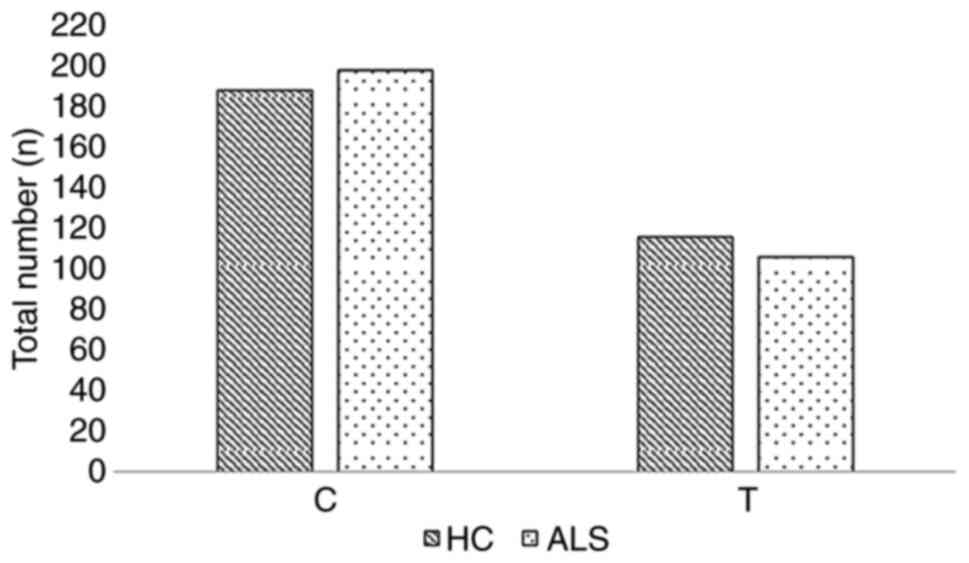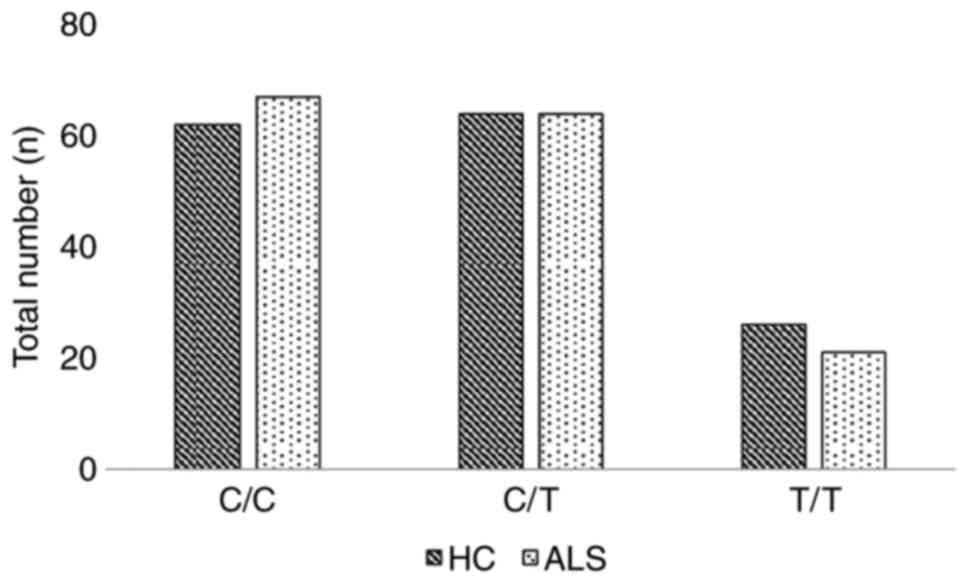|
1
|
Kojima Y, Kasai T, Noto YI, Ohmichi T,
Tatebe H, Kitaoji T, Tsuji Y, Kitani-Morii F, Shinomoto M, Allsop
D, et al: Amyotrophic lateral sclerosis: Correlations between fluid
biomarkers of NfL, TDP-43, and tau, and clinical characteristics.
PLoS One. 16:e02603232021. View Article : Google Scholar : PubMed/NCBI
|
|
2
|
Manjaly ZR, Scott KM, Abhinav K,
Wijesekera L, Ganesalingam J, Goldstein LH, Janssen A, Dougherty A,
Willey E, Stanton BR, et al: The sex ratio in amyotrophic lateral
sclerosis: A population based study. Amyotroph Lateral Scler.
11:439–442. 2010. View Article : Google Scholar : PubMed/NCBI
|
|
3
|
Marin B, Boumédiene F, Logroscino G,
Couratier P, Babron MC, Leutenegger AL, Copetti M, Preux PM and
Beghi E: Variation in worldwide incidence of amyotrophic lateral
sclerosis: A meta-analysis. Int J Epidemiol. 46:57–74.
2017.PubMed/NCBI
|
|
4
|
Mitsumoto H, Przedborski S and Gordon PH:
Amyotrophic Lateral Sclerosis. CRC Press; pp. p8722005, PubMed/NCBI
|
|
5
|
Masrori P and Van Damme P: Amyotrophic
lateral sclerosis: A clinical review. Eur J Neurol. 27:1918–1929.
2020. View Article : Google Scholar : PubMed/NCBI
|
|
6
|
Niedermeyer S, Murn M and Choi PJ:
Respiratory failure in amyotrophic lateral sclerosis. Chest.
155:401–408. 2019. View Article : Google Scholar : PubMed/NCBI
|
|
7
|
Abramzon YA, Fratta P, Traynor BJ and Chia
R: The overlapping genetics of amyotrophic lateral sclerosis and
frontotemporal dementia. Front Neurosci. 14:422020. View Article : Google Scholar : PubMed/NCBI
|
|
8
|
Ahmed RM, Devenney EM, Strikwerda-Brown C,
Hodges JR, Piguet O and Kiernan MC: Phenotypic variability in
ALS-FTD and effect on survival. Neurology. 94:e2005–e2013. 2020.
View Article : Google Scholar : PubMed/NCBI
|
|
9
|
Saberi S, Stauffer JE, Schulte DJ and
Ravits J: Neuropathology of amyotrophic lateral sclerosis and its
variants. Neurol Clin. 33:855–876. 2015. View Article : Google Scholar : PubMed/NCBI
|
|
10
|
Mejzini R, Flynn LL, Pitout IL, Fletcher
S, Wilton SD and Akkari PA: ALS genetics, mechanisms, and
therapeutics: Where are we now? Front Neurosci. 13:13102019.
View Article : Google Scholar : PubMed/NCBI
|
|
11
|
Dardiotis E, Aloizou AM, Siokas V,
Patrinos GP, Deretzi G, Mitsias P, Aschner M and Tsatsakis A: The
role of MicroRNAs in patients with amyotrophic lateral sclerosis. J
Mol Neurosci. 66:617–628. 2018. View Article : Google Scholar : PubMed/NCBI
|
|
12
|
Dardiotis E, Siokas V, Sokratous M,
Tsouris Z, Aloizou AM, Florou D, Dastamani M, Mentis AA and Brotis
AG: Body mass index and survival from amyotrophic lateral
sclerosis: A meta-analysis. Neurol Clin Pract. 8:437–444. 2018.
View Article : Google Scholar : PubMed/NCBI
|
|
13
|
Hardiman O, Al-Chalabi A, Chio A, Corr EM,
Logroscino G, Robberecht W, Shaw PJ, Simmons Z and van den Berg LH:
Amyotrophic lateral sclerosis. Nat Rev Dis Primers. 3:170712017.
View Article : Google Scholar : PubMed/NCBI
|
|
14
|
Siokas V, Aloizou AM and Pateraki G:
Chapter 21 - Toxicology of neurodegenerative diseases.
Toxicological Risk Assessment and Multi-System Health Impacts from
Exposure. Tsatsakis AM: Academic Press; pp. 247–258. 2021,
View Article : Google Scholar
|
|
15
|
Dardiotis E, Siokas V, Sokratous M,
Tsouris Z, Michalopoulou A, Andravizou A, Dastamani M, Ralli S,
Vinceti M, Tsatsakis A and Hadjigeorgiou GM: Genetic polymorphisms
in amyotrophic lateral sclerosis: Evidence for implication in
detoxification pathways of environmental toxicants. Environ Int.
116:122–135. 2018. View Article : Google Scholar : PubMed/NCBI
|
|
16
|
Tsatsakis AM: Toxicological Risk
Assessment and Multi-System Health Impacts from Exposure. Elsevier;
2021, View Article : Google Scholar
|
|
17
|
Mathis S, Goizet C, Soulages A, Vallat JM
and Masson GL: Genetics of amyotrophic lateral sclerosis: A review.
J Neurol Sci. 399:217–226. 2019. View Article : Google Scholar : PubMed/NCBI
|
|
18
|
Oskarsson B, Gendron TF and Staff NP:
Amyotrophic lateral sclerosis: An update for 2018. Mayo Clin Proc.
93:1617–1628. 2018. View Article : Google Scholar : PubMed/NCBI
|
|
19
|
Li HF and Wu ZY: Genotype-phenotype
correlations of amyotrophic lateral sclerosis. Transl Neurodegener.
5:32016. View Article : Google Scholar : PubMed/NCBI
|
|
20
|
Brown RH and Al-Chalabi A: Amyotrophic
lateral sclerosis. N Engl J Med. 377:162–172. 2017. View Article : Google Scholar : PubMed/NCBI
|
|
21
|
Ghasemi M and Brown RH Jr: Genetics of
amyotrophic lateral sclerosis. Cold Spring Harb Perspect Med.
8:a0241252018. View Article : Google Scholar : PubMed/NCBI
|
|
22
|
van Es MA, Hardiman O, Chio A, Al-Chalabi
A, Pasterkamp RJ, Veldink JH and van den Berg LH: Amyotrophic
lateral sclerosis. Lancet. 390:2084–2098. 2017. View Article : Google Scholar : PubMed/NCBI
|
|
23
|
Hou N, Yang Y, Scott IC and Lou X: The Sec
domain protein Scfd1 facilitates trafficking of ECM components
during chondrogenesis. Dev Biol. 421:8–15. 2017. View Article : Google Scholar : PubMed/NCBI
|
|
24
|
Stamati P, Siokas V, Aloizou AM,
Karampinis E, Arseniou S, Rakitskii VN, Tsatsakis A, Spandidos DA,
Gozes I, Mitsias PD, et al: Does SCFD1 rs10139154 polymorphism
decrease Alzheimer's disease risk? J Mol Neurosci. 69:343–350.
2019. View Article : Google Scholar : PubMed/NCBI
|
|
25
|
Bando Y, Katayama T, Taniguchi M,
Ishibashi T, Matsuo N, Ogawa S and Tohyama M: RA410/Sly1 suppresses
MPP+ and 6-hydroxydopamine-induced cell death in SH-SY5Y cells.
Neurobiol Dis. 18:143–151. 2005. View Article : Google Scholar : PubMed/NCBI
|
|
26
|
Carr CM and Rizo J: At the junction of
SNARE and SM protein function. Curr Opin Cell Biol. 22:488–495.
2010. View Article : Google Scholar : PubMed/NCBI
|
|
27
|
van Rheenen W, Shatunov A, Dekker AM,
McLaughlin RL, Diekstra FP, Pulit SL, van der Spek RA, Võsa U, de
Jong S, Robinson MR, et al: Genome-wide association analyses
identify new risk variants and the genetic architecture of
amyotrophic lateral sclerosis. Nat Genet. 48:1043–1048. 2016.
View Article : Google Scholar : PubMed/NCBI
|
|
28
|
Chen Y, Zhou Q, Gu X, Wei Q, Cao B, Liu H,
Hou Y and Shang H: An association study between SCFD1 rs10139154
variant and amyotrophic lateral sclerosis in a Chinese cohort.
Amyotroph Lateral Scler Frontotemporal Degener. 19:413–418. 2018.
View Article : Google Scholar : PubMed/NCBI
|
|
29
|
Ludolph A, Drory V, Hardiman O, Nakano I,
Ravits J, Robberecht W and Shefner J; WFN Research Group On
ALS/MND, : A revision of the El Escorial criteria-2015. Amyotroph
Lateral Scler Frontotemporal Degener. 16:291–292. 2015. View Article : Google Scholar : PubMed/NCBI
|
|
30
|
Dardiotis E, Karampinis E, Siokas V,
Aloizou AM, Rikos D, Ralli S, Papadimitriou D, Bogdanos DP and
Hadjigeorgiou GM: ERCC6L2 rs591486 polymorphism and risk for
amyotrophic lateral sclerosis in Greek population. Neurol Sci.
40:1237–1244. 2019. View Article : Google Scholar : PubMed/NCBI
|
|
31
|
Siokas V, Aloizou AM, Liampas I, Tsouris
Z, Mentis AA, Nasios G, Papadimitriou D, Bogdanos DP, Hadjigeorgiou
GM and Dardiotis E: Lack of association between TREM2 rs75932628
variant and amyotrophic lateral sclerosis. Mol Biol Rep.
48:2601–2610. 2021. View Article : Google Scholar : PubMed/NCBI
|
|
32
|
Siokas V, Karampinis E, Aloizou AM, Mentis
AA, Liakos P, Papadimitriou D, Liampas I, Nasios G, Bogdanos DP,
Hadjigeorgiou GM and Dardiotis E: CYP1A2 rs762551 polymorphism and
risk for amyotrophic lateral sclerosis. Neurol Sci. 42:175–182.
2021. View Article : Google Scholar : PubMed/NCBI
|
|
33
|
Liampas I, Siokas V, Aloizou AM, Bakirtzis
C, Tsouris Z, Nousia A, Nasios G, Papadimitriou D, Liakos P,
Bogdanos DP, et al: MOBP rs616147 polymorphism and risk of
amyotrophic lateral sclerosis in a greek population: A case-control
study. Medicina (Kaunas). 57:13372021. View Article : Google Scholar : PubMed/NCBI
|
|
34
|
Siokas V, Kardaras D, Aloizou AM,
Asproudis I, Boboridis KG, Papageorgiou E, Hadjigeorgiou GM,
Tsironi EE and Dardiotis E: BDNF rs6265 (Val66Met) polymorphism as
a risk factor for blepharospasm. Neuromolecular Med. 21:68–74.
2019. View Article : Google Scholar : PubMed/NCBI
|
|
35
|
Siokas V, Aslanidou P, Aloizou AM,
Peristeri E, Stamati P, Liampas I, Arseniou S, Drakoulis N, Aschner
M, Tsatsakis A, et al: Does the CD33 rs3865444 polymorphism confer
susceptibility to Alzheimer's disease? J Mol Neurosci. 70:851–860.
2020. View Article : Google Scholar : PubMed/NCBI
|
|
36
|
Solé X, Guinó E, Valls J, Iniesta R and
Moreno V: SNPStats: A web tool for the analysis of association
studies. Bioinformatics. 22:1928–1929. 2006. View Article : Google Scholar : PubMed/NCBI
|
|
37
|
GTEx Consortium: The genotype-tissue
expression (GTEx) project. Nat Genet. 45:580–585. 2013. View Article : Google Scholar : PubMed/NCBI
|
|
38
|
Iacoangeli A, Fogh I, Selvackadunco S,
Topp SD, Shatunov A, van Rheenen W, Al-Khleifat A, Opie-Martin S,
Ratti A, Calvo A, et al: SCFD1 expression quantitative trait loci
in amyotrophic lateral sclerosis are differentially expressed.
Brain Commun. 3:fcab2362021. View Article : Google Scholar : PubMed/NCBI
|
|
39
|
Keon M, Musrie B, Dinger M, Brennan SE,
Santos J and Saksena NK: Destination amyotrophic lateral sclerosis.
Front Neurol. 12:5960062021. View Article : Google Scholar : PubMed/NCBI
|
|
40
|
Kiernan MC, Vucic S, Talbot K, McDermott
CJ, Hardiman O, Shefner JM, Al-Chalabi A, Huynh W, Cudkowicz M,
Talman P, et al: Improving clinical trial outcomes in amyotrophic
lateral sclerosis. Nat Rev Neurol. 17:104–118. 2021. View Article : Google Scholar : PubMed/NCBI
|
|
41
|
Amado DA and Davidson BL: Gene therapy for
ALS: A review. Mol Ther. 29:3345–3358. 2021. View Article : Google Scholar : PubMed/NCBI
|
|
42
|
Yuan W, Beaulieu-Jones BK, Yu KH, Lipnick
SL, Palmer N, Loscalzo J, Cai T and Kohane IS: Temporal bias in
case-control design: Preventing reliable predictions of the future.
Nat Commun. 12:11072021. View Article : Google Scholar : PubMed/NCBI
|
















